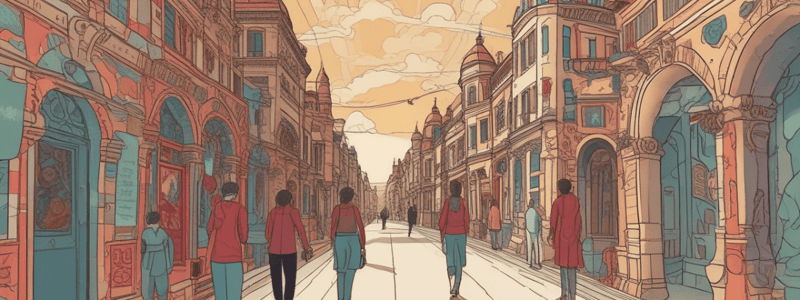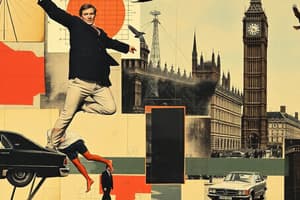Podcast
Questions and Answers
Match the type of cultural capital with its description:
Match the type of cultural capital with its description:
Embodied cultural capital = Formal recognition of cultural knowledge through diplomas and certificates Objectified cultural capital = Physical objects that show off cultural knowledge like books or art Institutionalized cultural capital = Skills, knowledge, and behaviors learned over time from family and education None of the above = Does not have a specific description
Match the benefits of having cultural capital with its description:
Match the benefits of having cultural capital with its description:
Getting a good job = Using cultural capital to stay in a high social position Being accepted into a prestigious school = Formal recognition of cultural knowledge through diplomas and certificates Joining important social groups = Physical objects that show off cultural knowledge like books or art All of the above = All the benefits of having cultural capital
Match the concept with its definition:
Match the concept with its definition:
Cultural capital = Physical objects that show off cultural knowledge Social inequality = The unequal distribution of cultural capital in society Pierre Bourdieu = The sociologist who developed the concept of cultural capital Embodied cultural capital = The skills, knowledge, and behaviors learned over time from family and education
Match the effect of cultural capital on society with its description:
Match the effect of cultural capital on society with its description:
Match the characteristics of embodied cultural capital with its description:
Match the characteristics of embodied cultural capital with its description:
Match the type of cultural capital with its benefit:
Match the type of cultural capital with its benefit:
Match the concept with its consequence:
Match the concept with its consequence:
Match the type of cultural capital with its example:
Match the type of cultural capital with its example:
Flashcards are hidden until you start studying
Study Notes
Cultural Capital
- Cultural capital refers to non-monetary assets a person has, such as education, way of speaking, manners, and appearance.
- According to Pierre Bourdieu, there are three types of cultural capital: embodied, objectified, and institutionalized.
Embodied Cultural Capital
- Embodied cultural capital includes skills, knowledge, and behaviors learned over time, mainly from family and education.
- Examples include speaking a certain way or having good table manners.
- It's not just about what you know, but also about how you present what you know.
Objectified Cultural Capital
- Objectified cultural capital involves physical objects showing off cultural knowledge, such as books, musical instruments, or art.
- Owning these objects can demonstrate cultural knowledge and be used to help others learn.
Institutionalized Cultural Capital
- Institutionalized cultural capital refers to formal recognition of cultural knowledge through diplomas and certificates.
- Examples include having a college degree, which shows that an institution has recognized your knowledge and skills.
Importance of Cultural Capital
- Cultural capital helps people navigate social structures and influences opportunities available to them, such as getting a good job or being accepted into a prestigious school.
- It affects who gets ahead in society and who doesn't.
- Cultural capital can lead to social inequality, as those with a lot of cultural capital often pass it down to their children, keeping the same families wealthy and powerful over generations.
Conclusion
- Bourdieu's idea of cultural capital explains how culture affects social mobility and inequality.
- It highlights the importance of having certain cultural skills and knowledge for personal success and understanding social inequalities.
Studying That Suits You
Use AI to generate personalized quizzes and flashcards to suit your learning preferences.




